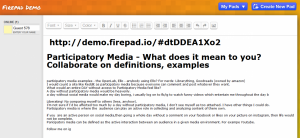Today we discussed participatory media and open data. We ran out of time before we could discuss the differences between open data and big data; this article does a nice job with the concepts. I was hoping to discuss some of the participatory open data projects [Buiilding Inspector, What’s on the Menu?] of NYPL labs in class, so explore those projects on your own time if you like. Remember our collaborative writing on participatory media?
On Monday, February 23 we will talk about copyright and fair use and the open access movement. Please read and view the following:
Center for Social Media, The Code of Best Practices in Fair Use for Media Literacy Education, sections Code and FAQ only
Jeanty, “US Copyright Office Rules that Monkeys Can’t Copyright their Selfies”
Videos: Grey, “Copyright: Forever Less one Day”
Lessig, “Laws that Choke Creativity”
Faden, “A Fair(y) Use Tale”
Your blogging assignment is one reading/viewing response blog post.
~Prof. Leonard



